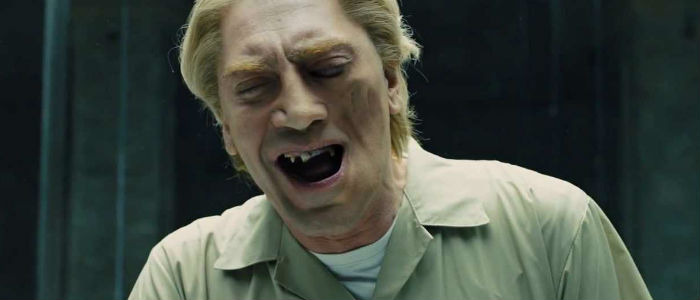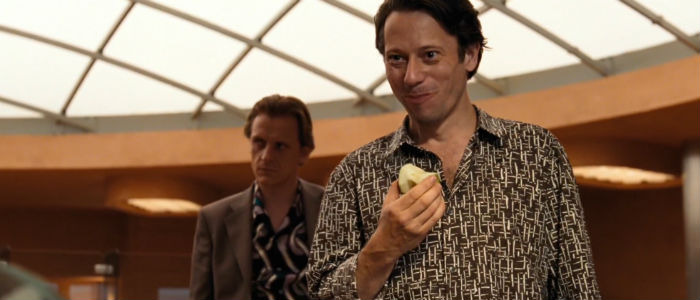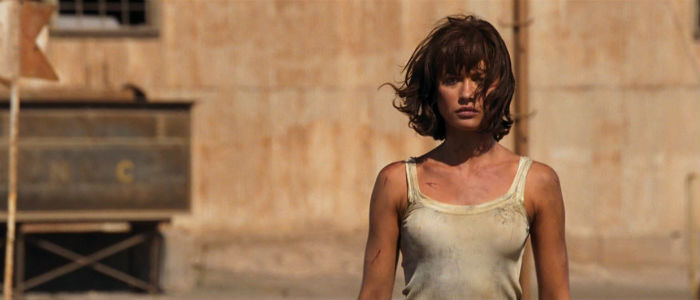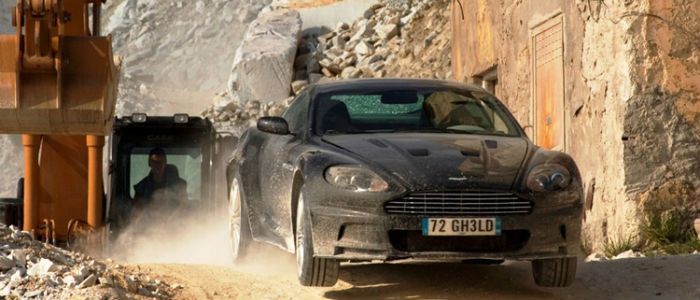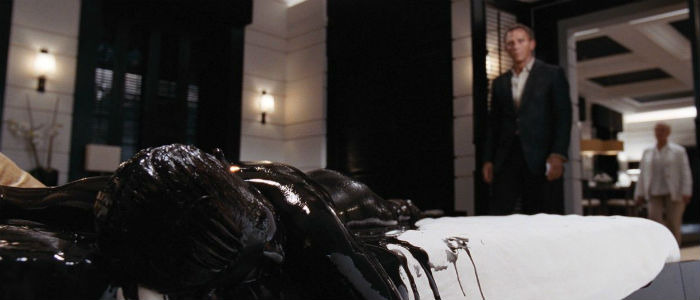The Unpopular Opinion: 'Quantum Of Solace' Is The Second Best Daniel Craig 007 Movie
(Welcome to The Unpopular Opinion, a series where a writer goes to the defense of a much-maligned film or sets their sights on a movie seemingly beloved by all. In this edition: Quantum of Solace deserves better than the frequently snide dismissals you've all been giving it.)Casino Royale (2006) is not only the best of Daniel Craig's James Bond movies, but it's the best Bond movie period. That's just factual and not up for debate, but there seems to be less certainty when it comes to ranking the remaining three films from his tenure as 007. It's easy, though, if you remember that the chronological order is also the order of descending quality – Casino Royale > Quantum of Solace (2008) > Skyfall (2012) > Spectre (2015). Yup, they're a series of diminishing returns. You're welcome.
Those Other Two? Pretty, Dumb, and Bloated
Look, don't get me wrong, both Skyfall and Spectre have their positives. They feature some solid action beats, appealing supporting players like Albert Finney and Léa Seydoux, and attractive cinematography with the former in particular delivering jaw-dropping visuals courtesy of cinematographer Roger Deakins. Both stumble, though, with their often obtuse, cluttered, and utterly idiotic scripts. After two films featuring Bond as a brutish, young-ish agent, Skyfall introduces him as a near over the hill agent already weary with the world, meaning we've completely bypassed the middle ground where he's just a kick-ass spy doing his job.
It's focused on that bland and overly familiar plot of a stolen list of undercover agent names, Bond lets the assassin in Shanghai kill three people before even attempting to intercede, he has sex with a woman he knows was a child sex slave (and who then dies, of course), and the top nerd at MI6 connects a suspect's laptop to their internal network! Seriously, I worked IT for a coffee retailer and even we knew better than to do something that stupid. Toss in an elaborately moronic plan by the villain, and you have a big, beautiful disappointment. Spectre doubles down on the idea that we should care about Bond's childhood – spoiler, we don't – and then gives us a ridiculous supervillain responsible for the deaths of every woman Bond's ever swapped spit with? Dumb. Both movies are beautiful but inane garbage fires.
But I'm not here to knock down those two blockbuster misfires. I'm here to lift up the second best of the Craig-era Bond films – the smarter, more engaging, and equally beautiful Quantum of Solace. (Yeah, I don't know why this counts as an "unpopular" opinion either.)
Think of It as a Fourth Act
The only criticism facing Quantum of Solace that you won't see me arguing against is in regard to its running time. Clocking in at a mere 106 minutes it's the shortest of the twenty-four Bond movies. By contrast, the other three Craig-led Bond films are the three longest of the franchise at 144, 143, and 148 minutes respectively. So yes, on a purely mathematical level it's easy to see why some people might feel ripped off when it comes to thinking they've been shafted when it comes to bang for their buck as it's forty minutes shorter than the film that precedes it.
But – and yes, this is where I argue the thing I literally just said I wouldn't argue – its shorter, tighter story actually shines if you think of it as the fourth act to Casino Royale. Seriously, next time you watch and love Casino Royale follow it immediately with Quantum of Solace. The result might surprise you.
Past and future Bond films carry over characters and references, but as the only direct sequel – as in picking up the action mere minutes to hours later – in the series Quantum of Solace actually wraps up Casino Royale rather nicely. It directly continues the immediate storyline, concludes an emotional arc involving Vesper Lynd, adds more to the mythology of the villainous agency combating MI6, and tosses in some fresh dramatic thrills along the way.
Mr. White is captured by Bond at the end of one film and is being transported to an MI6 black site at the very beginning of the next. His interrogation with M goes awry, but they manage to get some information regarding the dastardly organization Quantum as well as more specifics regarding Vesper's betrayal. That latter detail allows for a coda that closes the most romantic chapter in Bond's life as he learns the truth and tragedy behind her actions in the previous film. It's this that ultimately hardens his heart and seals his fate as the love 'em and leave 'em Bond we all know. It's this knowledge – he let someone in, and the world forced her betrayal – that confirms his turn into a soulless, hard-hearted dick as capable of bedding a woman forced into sex slavery (Skyfall) as he is of shtupping a widow the day she buries her husband (Spectre). There's character growth here, and that's never a bad thing.
Women Rule, Boys Drool
Before reaching that point, though, Quantum of Solace sees him cross paths with two women as diametrically opposed as any in the Bond universe. Like the unfortunately named Honey Rider, Christmas Jones, Pussy Galore, and Holly Goodhead before her, Strawberry Fields (Gemma Arterton) is saddled with an utterly cartoonish name that makes it difficult to take her seriously. And like many of the women in Bond's world she sleeps with him and winds up dead the next day (this time via a nod to Goldfinger). The incident earns Bond a rare rebuke with M (Judi Dench) criticizing him for dragging women into harm's way simply because he wants a quick and callous shag. "She worked in an office," says M. "Look how well your charm works James. They'll do anything for you." We've seen this pattern before (and will again), but hearing another character, especially a female, call out his deadly behavior is refreshing.
Camille Montes (Olga Kurylenko) is her flip side in every way. She's a "Bond girl" allowed to be completely disinterested in sleeping with him, but more than that, she's a female character with her own past, future, and present agenda. She's not there for him and in fact is pissed when he intrudes into her storyline. Camille is on a quest for revenge, a vengeance that she succeeds in acquiring by film's end, and her methods have been every bit as shifty and sleazy as the ones Bond employs. "You infiltrated Green's organization by having sex with him?" asks Bond, to which she replies "That offends you?" "No, not in the slightest," he says with a smile. Like him, she's a driven personality willing to use whatever it takes to achieve a goal, and there's a unique respect at play here between Bond and a woman who he'd be trying to seduce in any other film. He holsters his license to diddle and at one point even says he's sorry to her – James Bond gives a sincere apology to a woman!
As action/thrillers, the Bond films are filled with violence, but while most male characters who die do so while engaged in a fight of their own making, the women are often collateral damage. Many of them exist to provide information and horizontal mambo time before being snuffed and/or forgotten, but Quantum of Solace actually highlights violence against women as a thematic element. From M's comments to Bond after Strawberry's death, to Camille's own backstory and her road to revenge, to the coda where Bond confirms that Vesper's actions were done out of fear of violence, weight is given to women and the suffering they endure at the hands of men.
Camille is also highly capable of kicking ass when required due as much to her determination as to her training. The list of Bond girls who are an active part of the action is a short list indeed – Camille, Wai Lin (Michelle Yeoh, Tomorrow Never Dies), Eve Moneypenny (Naomie Harris, Skyfall), and that's it right? And Eve is relegated to desk duty after just one film because she's supposedly not cut out for the field! So it's really just Camille and Wai Lin. Across twenty-four movies and fifty-three years.
Despite where the film leaves Bond at the end, the journey there is one featuring rare emotion for the character and the franchise. He recognizes Camille's pain, both in her story and her need for revenge, and as their world is burning down around them Bond lets his own quarry go to help her instead. She's succeeded in her quest for revenge, but the surrounding fire and painful memories of a similar circumstance from her childhood have left her paralyzed. He gets her to safety and the two part ways having never seen each other's nether regions. Kurylenko does a great job here with the franchise's most multi-dimensional female character, and I'd love to see them bring her back into Bond's world for a second go-around.
Lights, Camera, Action!
One of the frequent (and nonsensical) complaints about the film is in regard to its opening car chase being hard to follow because of choppy editing and similar paint jobs. Speaking as someone who pays attention to the movies I'm watching, I can only say that there's not a moment of the chase that leaves me confused as to who I'm watching, the spatial relationship of the cars in question, or the geography of the area. Director Marc Forster drops viewers immediately into the fray, and he also makes it clear his approach to action leans more earthy and impactful than some might like. We can almost feel the metal grinding and colliding, and there's a near threat of choking on the debris of car parts and dirt thrown into the air. Breathe it in, haters.
The car chase gives way to a pretty terrific foot chase and fight that again sees Bond and his opponent trading blows that damage the landscape around them. The two rough each other up before landing in a church under reconstruction. Scaffolding provides a thrilling set-piece teasing Jackie Chan-like mechanics, and their attempts to acquire a loose gun see the pair forced to engage in a fight that values vertical spaces even more than the horizontal. Another fistfight erupts in a Haiti hotel room, but it trades elaborate design and longevity for pure and short-lived brutality.
For fans of larger scale action beats the film delivers a boat chase and plane fight that each bring varying degrees of thrills. I'm more partial to the water action as there's a more tangible feel to the boats speeding across the surface and occasionally through each other, but there's fun to be had in the air as Bond tries and fails to out-maneuver a smaller, armed plane and a more-skilled pilot.
Mathieu Amalric's bug-eyed Dominic Greene is an under-appreciated villain in the Bond universe for several reasons including his very grounded "evil" plan involving corrupt governments and a devious effort to control water supplies, but pound for pound he's also a legitimate threat in a fight against Bond. He shouldn't be, obviously, but rather than make him an inexplicably good fighter simply to make him a threat against Bond he's instead allowed to just be unpredictable and scrappy. Amalric transforms into a rabid weasel for the end fight, and while Bond has faced larger, more talented foes Greene is every bit as dangerous as he flails and swings while screaming like the scared little madman he is. The fire and collapsing infrastructure around them is just icing on the cake that is these two brawling.
But Seriously, Quantum of Solace is Aces
Could some of the negativity toward the film actually be due to its more pro-women stance than fans maybe prefer? The cynic in me says probably yes, but if so, those people are shmucks who can't be reasoned with. I still have faith in the rest of you, though, and hope you'll consider a re-watch. It's a fun, quick watch – unless you pair it with Casino Royale, in which case it's a fun, not-so-quick watch – with a tart and snappy Judi Dench, a little more of Jeffrey Wright's Felix Leiter, some thrilling action beats, a grounded and gritty villain, and one of the best, most interesting and engaging Bond girls. The movie's title may be nonsense (much like the general dislike of the film itself), but it's never too late to embrace it and form a correct opinion on the second best of Daniel Craig's Bond films.

